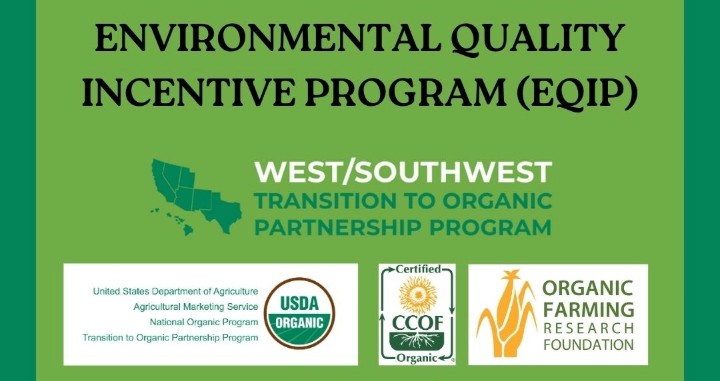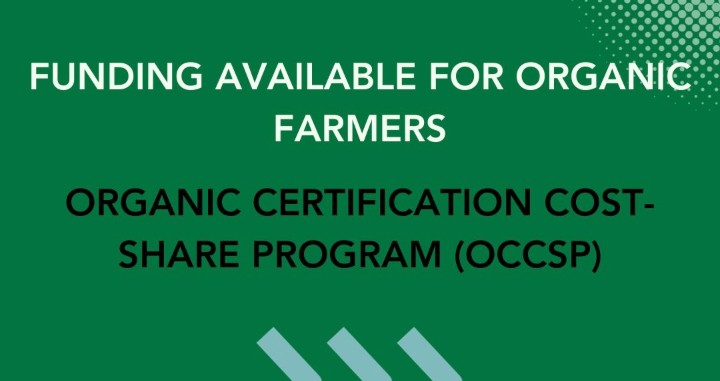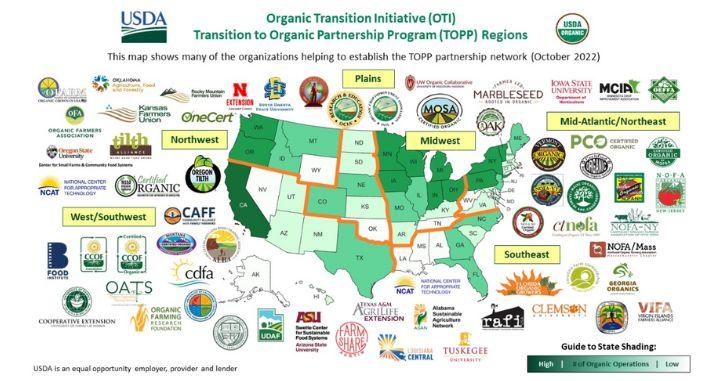Organic & Transitioning Farmer Resources
General Resources
For pandemic-specific farmer support, visit the special Coronavirus Resources page. OFRF also offers several resources to help farmers and ranchers manage risk. All resources are available to download for free.
USDA Transitioning to Organic Partnership Program (TOPP)
The Transition to Organic Partnership Program (TOPP) is investing up to $100 million over five years in cooperative agreements with non-profit organizations who are partnering with others to provide technical assistance and wrap-around support for transitioning and existing organic farmers. There are partnership networks in six regions across the United States with trusted organizations serving direct farmer training, education, and outreach activities. We also have TOPP resources on our website here.
ATTRA Sustainable Agriculture Program
ATTRA is a program developed and managed by the National Center for Appropriate Technology (NCAT). ATTRA services are available to farmers, ranchers, market gardeners, Extension agents, researchers, educators, farm organizations, and others involved in agriculture, especially those who are economically disadvantaged or belong to traditionally underserved communities.
eOrganic
eOrganic offers resources for farmers, ranchers, agricultural professionals, certifiers, researchers, and educators seeking reliable information on organic agriculture at eXtension.
National Organic Program (NOP)
Established by Congress in 2001, this federal regulatory program develops and enforces uniform national standards for organically-produced agricultural products soil in the United States. Operations as a public-private partnership, NOP accredits private companies and helps train their inspectors to certify that farms and businesses meet the national organic standards.
Organic Materials Review Institute (OMRI)
The Organic Materials Review Institute (OMRI) is an international nonprofit that provides an independent review of products, such as fertilizers, pest controls, livestock health care products, and numerous other inputs that are intended for use in certified organic production and processing. OMRI supports organic integrity by developing clear information and guidance about materials, so that producers know which products are appropriate for organic operations. OMRI also provides technical support and training for professionals in the organic industry.
Organic Agriculture Research and Extension Initiative (OREI)
OREI seeks to solve critical organic agriculture issues, priorities, or problems through the integration of research, education, and extension activities. The purpose of this program is to fund projects that will enhance the ability of producers and processors who have already adopted organic standards to grow and market high quality organic agricultural products. Priority concerns include biological, physical, and social sciences, including economics.
Sustainable Agriculture Research & Education (SARE)
Since 1988, the SARE grants and education program has advanced agricultural innovation that promotes profitability, stewardship of the land, air, and water, and quality of life for farmers, ranchers, and their communities. Read more…
USDA Natural Resources Conservation Service (NRCS)
NRCS provides farmers and ranchers with financial and technical assistance to implement conservation improvements on their land. Read more…
United States Department of Agriculture (USDA)
USDA offers a variety of information and resources for organic farmers, both new and transitioning. Read more…
United States Department of Agriculture Risk Management Agency (RMA)
RMA provides coverage for certified organic acreage and transitional acreage (acreage transitioning to certified organic acreage in accordance with an organic plan). Insurance can only be provided for any crop grown using organic farming practices when a premium rate for an organic practice is specified in the actuarial documents or there is an approved written agreement.
National Center for Appropriate Technology (NCAT)
NCAT is a national non-profit that helps people by championing small-scale, local, and sustainable solutions to reduce poverty, promote healthy communities, and protect natural resources.
Transitioning to Organic Partnership Program (TOPP) Updates
Environmental Quality Incentives Program (EQIP)
NRCS’ EQIP program offers financial assistance and technical support to implement new conservation practices on your farm, with additional support for historically underserved applicants including socially disadvantaged, beginning, veteran, and limited-resource farmers and ranchers.
Organic Certification Cost Share Program (OCCSP)
The process of obtaining and maintaining organic certification can be costly. The good news is that financial assistance is available through the Organic Certification Cost Share Program (OCCSP) to help ease this burden.
TOPP West Resources
As part of the larger $300 million USDA Organic Transition Initiative (OTI), the Natural Resource Conservation Service (NRCS) has begun to make $70 million available to help producers adopt organic management systems. These resources provide information on how to apply for various support programs.
Instructional Videos
Furrow Cover Crops for ‘Greener’ Strawberries & other Plastic Mulched Crops
Produced and narrated by Dr. Eric Brennan, USDA-ARS
Cover Cropping on Beds: Novel Equipment and Ideas
Produced and narrated by Dr. Eric Brennan, USDA-ARS
NRCS: Assistance for Organic Farmers
USDA Natural Resources Conservation Service
NRCS: Healthy Soil
USDA Natural Resources Conservation Service
NRCS: Weed Management
USDA Natural Resources Conservation Service
NRCS: Habitat
USDA Natural Resources Conservation Service
NRCS: Irrigation
USDA Natural Resources Conservation Service
NRCS: Pasture Management
USDA Natural Resources Conservation Service
Reduced Tillage System for Organic Production
Iowa State University, Extension and Outreach






